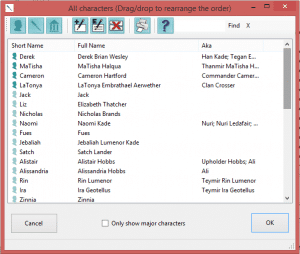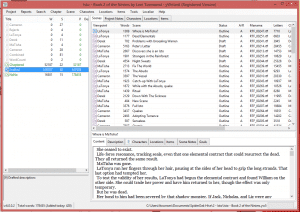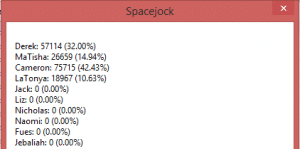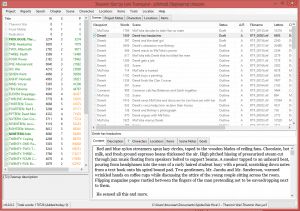Why I Like yWriter
I had intended to post this last week, but illness struck the Town’s End (again), and I completely spaced blogging while I instead cared for my kiddos. My friend Angela had asked our local Treasure Valley NaNo Facebook group if anyone used yWriter or something similar and what their thoughts were about it. I quickly piped up that I loved it and used it for my big books. Others chimed in how much they liked Scrivener.
But that little “Thoughts?” part ending her inquiry made it hard for me to leave it at that. I’m a verbose person. I like explaining and sharing knowledge. So, I wrote up the following for her. She requested I post it to a more shareable platform, aka my blog. Here it is for all of you!
Why I like yWriter (with pictures)
(Click the pictures to view larger versions.)
I use yWriter for my larger projects because of the way I write: I have multiple points of views and I write scenes as I visualize them.
First off, I can define my POVs (along with other of my numerous characters):
I mark my POVs as major (thus they appear darker) and the other characters I’ve defined as minor.
Since my natural method of writing is to write whatever I have in my brain, I just create a new scene, set the POV character, give a one-liner of what the scene’s about, drag to where I think I want it, and go. This is a glimpse of my current project to give you an idea:
It gives me a word count for each scene and whose POV it is. I try to keep consistent chapter word counts, so this helps when I start figuring out how to group them together.
Phase 1, I just do it by putting it in the scene name:
Phase two, I start breaking them into their own chapters. For instance, here is a view of Thanmir War:
The drag and drop ability to move scenes around is what got me the most. I might be writing a scene and decide to throw something in, and realize it might fit better in one spot than the other, or just dragging and dropping scenes from one chapter to another, yWriter makes that easy.
I’m also a curious, analytic type. I can run a report to find out word count per character.
I’m also a person who writes a lot, and then tosses it out. I can toggle a scene or even a chapter as unused. For instance, I’ve got one chapter in Thanmir War that I’ve marked as unused, with a bunch of scenes that I wrote that I never used in the book:
This way, I don’t lose any of my writing even though I’m not going to use it.
Reading might feel like a bit of a pain because you’ve only got one scene per window and it’s not continuous:
You can click Next to move on to the next one, but you also have the option to export the entire project to RTF (which opens in Word, if you’d like) or just a single chapter. When you export the project as RTF, it puts the title of each chapter at the top of a new page, inserting nice page breaks and what not.
You can also go to ebook or HTML, both of which I’ve used for releasing my final product to Kindle.
You can also split a scene, if you decide it really should be multiple. I’ve also imported an entire document and then split it into the scenes using that functionality.
There are other tools within yWriter that are available, I just don’t use them. I don’t track settings (like the place the characters are at), I don’t track items (weapons and such), I don’t set daily writing targets, I don’t plan or structure my story in advance.
Flaws I’ve noticed:
* Ctrl + Z doesn’t always undo to the point you think it should. (But I’ve had this occur in Notepad so I’m inclined to believe it’s more of a Windows problem than a yWriter problem.)
* Dragging scenes from the bottom of a long list toward the top sometimes makes the window scroll weird. I usually have to drag to the top of my screen, drop, scroll, then drag again. If creating a new scene, it’s much easier to open the scene just before or after it and choose to create a new one from there.
* There isn’t an app for that
When don’t I use yWriter?
If I’m writing a short story, I’ll typically do it in Google Docs just because it autosaves as I type and I’m confident it’ll pick up where I left off if I have to suddenly close my browser. For longer pieces but single POV, like the Cera Chronicles, I’ll use Word because I think and write linear with those stories. I don’t have an overall plan for how the story will go, so I’m just pansting it with a semi-reasonable series of events. There is nothing in those stories that inspire me to write out of order, so I just write. Word is aesthetically pleasing for me when I’m writing, but I’m not sure that matters. Google Docs also allows for Word Editing, so I can go through it on my phone.
Not being able to read/edit my big books on my phone is a frustration*. I would love to be able to pull it up and read it in a continuous layout and make edits in yWriter, but I can’t do that unless I plan ahead and export the project. yWriter isn’t a web-based tool, so it doesn’t store stuff in the cloud. To get around that, I use a number of cloud syncing services. For my big books, I use SpiderOak. I install SpiderOak and yWriter on all the computers I write on (three at the moment). It’s got a 2GB storage limit, and all my yWriter projects total 731MB:
This gives me access to my writing on whatever computer I’m working on. This is good, considering how many USB drives I’ve destroyed. It just doesn’t help me on my phone because the SpiderOak app only allows me to read the files, and it doesn’t open the .yw# files. I can dig into the RTFs since yWriter stores each scene as an RTF, but the naming convention doesn’t tell you much about what’s on the inside:
Since I do like to pull up my Cera Chronicles on my phone, I store those in Google Drive for ease of access in Google Docs.
So there you have it! I went with yWriter over Scrivener because A) I am cheap and B) when I demoed Scrivener (5 years ago), I couldn’t find a way to indicate POV, which was a really big deal for me. After I found yWriter and it did exactly what I wanted, I felt no need to look elsewhere.
Download yWriter here. (No one paid me for this review. I just like spreading helpful knowledge and sharing useful tools.)
*As a programmer myself, I know the limitations of trying to build an app for different platforms, so I have no expectations that there will be one in the future. Also, with the capabilities of yWriter, trying to tailor it to a touch-only environment would be difficult, and I’d dig in my heels if it were suggested to me. But a squirrel can dream. I think I’ll just wait for technology to advance to the point where I can pull up any application on my mobile device and display it in interactive holographic form right in front of me.
Do you use any special software for your writing? Have you used yWriter before? What are your thoughts about the pros and cons?
The post Why I Like yWriter appeared first on Squirrel Talk.











